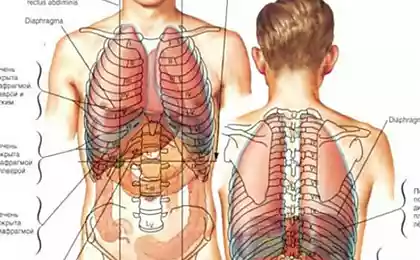466
Emotional color-blind: why are not all able to realize their own feelings
Fifty four million nine hundred sixty three thousand three hundred forty three
© Axel Oswith
Some people very well understand their emotions and easily realize that causes them to commit a particular act. And others difficult to understand what they feel in the moment, and even more so — to explain it to others. Such an identity is called alexithymia.
"Help us to react" — asks friends hero of the popular series "Community," Abed Nadir, once in a situation that requires an immediate emotional response. This character has a whole bunch of features that are often attributed to talented geeks, he is difficult to converge with people, is poorly understood other people's emotions and displaces into the subconscious of your own. The average person, even bewildered, most likely, would not have problems with understanding what he feels in the situation — anger, joy, fear or something else. Alexithymic is also very easy to track your current thoughts, but not able to understand the affective side of the self.
The term in 1973 suggested that the Harvard psychiatrist and psychoanalyst Peter Sifneos, observed a number of specific features in patients of psychosomatic clinics. Alexithymia literally means "without words for feelings". The term has often been criticized, but has become very popular.
According to psychological references, alexithymia includes the following qualities:
— difficulties in definition and description (verbalization) of own emotions and emotions of other people;
— difficulties in distinguishing between emotions and bodily sensations;
— reduced ability to symbolise, in particular, to fancy;
— the desire to focus primarily on external events to the detriment of internal experiences;
— the tendency to a very specific, logical and utilitarian thinking with a deficit of emotional reactions. Alexithymic is likely to make decisions without trying to find their innermost desires and motivations.
Some researchers also believe that people with alexithymia rarely see bright, colorful dreams, or their dreams are full of events from daily life and are distinguished by the poverty of the plot. However, people with a strong alexithymics features do not have to match all items from the list — these traits can be divided into groups associated with disturbances in cognitive and affective areas. To the first, for example, are utilitarian thinking, the poverty of imagination and lack of creativity. Second — the actual problem of discernment of emotions.
But how large are these problems? At first glance it may seem that the only difficulty that one experiences with alexithymia, inability to describe his feelings as good as it would have made Proust or Dostoevsky. And naklonost to the dreams and utilitarian thinking can be a plus even in some critical situation. If not a few nuances. First, alexithymic is experiencing less emotion than any other man, but he they find no exit, and our mental mechanisms are so arranged that regularly "let off steam" in some degree necessary. Don't have to yell or have a pillow fight — but allowing yourself to feel a particular emotion, and watching her course, we already largely becoming obsolete the accumulated tension. This possible to remove the voltage alexithymic and deprived.
In addition, to sort out their emotions at least at a basic level is useful because in some cases it helps to make the right decisions: whether to stay at this workplace, whether to invite that girl out on a date whether to go again for a performance in this theatre and so on. Not all questions we can solve it logically, sometimes it takes the same emotional "inner voice". And alexithymic, even if he will be able to understand (often a physical feeling) that he is experiencing some negative emotions, often can not distinguish anger is a longing or fear. Not to mention the fact that he is not always able to distinguish between positive emotional arousal from the negative — and that, anyway, is critical.
Mental health and EQ
Despite all the associated difficulties, alexithymia is not a disease and not a diagnosis, but only characteristics of the individual. It is worth remembering that alexithymia can be quite a healthy person, although alexithymia is often found in people suffering from mental illnesses — including depression, schizophrenia, autism and psychosomatic disorders.
It is also important not to confuse alexithymia with a lack of emotional intelligence: EI is a much broader concept and involves the successful identification and feelings of others, empathy, ability to manage their emotions and turn the situation in their favor for all these skills, and alexithymia in the traditional sense of the term puts the emphasis on the ability of the entity to understand and describe their own emotions. But it often goes together with weak empathy, so alexithymia often have problems with communication. Not to mention the fact that not everyone is willing to build a relationship with a man, incapable of a rich emotional feedback. However, all this does not mean that alexithymic can't self-actualize in an ambitious project or personal life. Just some things they will learn harder than others.
Congenital or acquired?
It is believed that alexithymia could be both innate and acquired. Innate associated with physical reasons — it can be a minor malformations, the effects of hypoxia during pregnancy or in childbirth, of disease, moved in infancy. This form of alexithymia is difficult to treat. Maybe the people with alexithymia microogranism there are also abnormalities in the brain structure — at least, some research suggests that such people have lost communication between the hemispheres of the brain due to disorders in the structure of performing this communication is the corpus callosum.
Acquired, or secondary alexithymia, appears at an older age, physically healthy people as a result of a serious nervous shock, stress, various psychological trauma, neurological disease. On the development of alexithymia can influence and education. Maloemotsionalny parents, taboos on expression of emotions on humans or, conversely, a negative experience with hyperemotional personalities lead to the inability to differentiate and describe feelings in adulthood.
Strong alexithymia traits manifest about seven or eight percent of the population. And men, the realization and description of private feelings is difficult about four times more often than women, and this may be due to the pressure of society and the popular stereotype about "boys don't cry".
Let off steam
As we have already mentioned, even if alexithymic looks impassive, this does not mean that he experiences a smaller range of emotions than normal people. What to do with these unconscious emotions?
In some cases they accumulate, which leads to the so-called affective reactions when people at a small event suddenly throws the fountain of the senses, is clearly inadequate to the situation, e.g., breaks furniture or breaking dishes during a dispute over toothpaste. When this condition passes, the subject understands that the reaction was disproportionate to the occasion, and feels guilt and shame, which manifest themselves in unpleasant sensations. It makes him even more in the future to control their feelings, why they accumulate even more, and this leads to new outbreaks. It is a vicious circle.
In other cases, unexpressed emotions find an outlet in physical ailments — indeed, that is why Dr. Sifneos discovered this phenomenon in the clinic for people with psychosomatic disorders. A typical example is the so-called masked depression: when a person is not aware of their dissatisfaction with life or allows himself to be, he had not found typical signs of depression (lowered mood, a sense of meaninglessness of life, apathy and so on), but negative emotions are manifested in weakness, pain, problems with breathing and palpitations and so forth.
How to measure
To determine the severity of alexithymia using various questionnaires: BIQ (questionnaire Beth Israel), АРВQ (based on the scale BIQ), SSPS (personal scale Sifnoes); also used a 22-point scale in the MMPI alexithymia. But the data obtained through them were quite controversial, so that the most widely proposed in 1985 by George Taylor 26-point alexithymia the Toronto scale (TAS). Numerous studies of its use have proved stability, reliability, and validity of the results. Now there's a more modern 20-point version of the questionnaire.
What to do if you or a loved — alexithymic?
It is believed that congenital alexithymia respond poorly to correction, but the secondary can be cured with psychotherapy — in particular, gestalttherapie, art therapy, hypnosis and psychodynamic therapy. All these therapies help the person to recognize and Express their emotions. Psychosomatic disorders, panic attacks and depression sometimes associated alexithymia, it makes sense to treat it with medication — but in any case, you need to consult a therapist.
Professor of psychology Deborah of Serani gives alexithymia and their families the following tips:
"If your loved — alexithymic, do not punish him for his emotional unresponsive — a consequence of its neurobiological and psychological nature. Instead, be patient, explain your needs and happens more succinct: "I'm tired and don't want to cook. Let's get dinner ready" (instead of a long story about his fatigue, in the hope that people will understand that you are unable to cook dinner. — Primas'. T&R). And help them recognize emotions and give them names: "You look angry. Is there anything bothering you?"Help them to pay attention to the obvious triggers of emotion: "you Have exams coming up, you feel anxiety?"The realization that your loved one may not speak your emotional language will help in case of conflict or misunderstanding.
If you have alexithymia, your goal is to enhance your ability to identify and understand the feelings. The study of the subjective experience of others is also important. Here are some ways to develop these skills:
1) Diary. Research shows that expressive writing can help to develop a person's ability to recognize emotions. It is recommended to keep a diary every day, describing significant events.
2) Read novels. The language of the description of thoughts, feelings, moments and experiences that literally lives in the novels. Research shows that it is a great way to learn how to Express pent-up feelings.
3) Expressive art. Acting lessons, dance, art class or therapy through movement to help people with alexithymia to recognize and Express their emotions.
4) Group psychotherapy. The interactive aspect of group therapy allows children and adults to explore their own thoughts and feelings, and experience sharing emotional experience with other people.
5) Hypnosis and relaxation lessons. While most types of psychotherapy use conversation as the primary way to reduce the symptoms of alexithymia, hypnosis and relaxation lessons and develop the imagination and skills of mentalization (the ability to imagine the mental state of another person. — Primas'. T&P) to strengthen the understanding of emotions.published
Source: theoryandpractice.ru
© Axel Oswith
Some people very well understand their emotions and easily realize that causes them to commit a particular act. And others difficult to understand what they feel in the moment, and even more so — to explain it to others. Such an identity is called alexithymia.
"Help us to react" — asks friends hero of the popular series "Community," Abed Nadir, once in a situation that requires an immediate emotional response. This character has a whole bunch of features that are often attributed to talented geeks, he is difficult to converge with people, is poorly understood other people's emotions and displaces into the subconscious of your own. The average person, even bewildered, most likely, would not have problems with understanding what he feels in the situation — anger, joy, fear or something else. Alexithymic is also very easy to track your current thoughts, but not able to understand the affective side of the self.
The term in 1973 suggested that the Harvard psychiatrist and psychoanalyst Peter Sifneos, observed a number of specific features in patients of psychosomatic clinics. Alexithymia literally means "without words for feelings". The term has often been criticized, but has become very popular.
According to psychological references, alexithymia includes the following qualities:
— difficulties in definition and description (verbalization) of own emotions and emotions of other people;
— difficulties in distinguishing between emotions and bodily sensations;
— reduced ability to symbolise, in particular, to fancy;
— the desire to focus primarily on external events to the detriment of internal experiences;
— the tendency to a very specific, logical and utilitarian thinking with a deficit of emotional reactions. Alexithymic is likely to make decisions without trying to find their innermost desires and motivations.
Some researchers also believe that people with alexithymia rarely see bright, colorful dreams, or their dreams are full of events from daily life and are distinguished by the poverty of the plot. However, people with a strong alexithymics features do not have to match all items from the list — these traits can be divided into groups associated with disturbances in cognitive and affective areas. To the first, for example, are utilitarian thinking, the poverty of imagination and lack of creativity. Second — the actual problem of discernment of emotions.
But how large are these problems? At first glance it may seem that the only difficulty that one experiences with alexithymia, inability to describe his feelings as good as it would have made Proust or Dostoevsky. And naklonost to the dreams and utilitarian thinking can be a plus even in some critical situation. If not a few nuances. First, alexithymic is experiencing less emotion than any other man, but he they find no exit, and our mental mechanisms are so arranged that regularly "let off steam" in some degree necessary. Don't have to yell or have a pillow fight — but allowing yourself to feel a particular emotion, and watching her course, we already largely becoming obsolete the accumulated tension. This possible to remove the voltage alexithymic and deprived.
In addition, to sort out their emotions at least at a basic level is useful because in some cases it helps to make the right decisions: whether to stay at this workplace, whether to invite that girl out on a date whether to go again for a performance in this theatre and so on. Not all questions we can solve it logically, sometimes it takes the same emotional "inner voice". And alexithymic, even if he will be able to understand (often a physical feeling) that he is experiencing some negative emotions, often can not distinguish anger is a longing or fear. Not to mention the fact that he is not always able to distinguish between positive emotional arousal from the negative — and that, anyway, is critical.
Mental health and EQ
Despite all the associated difficulties, alexithymia is not a disease and not a diagnosis, but only characteristics of the individual. It is worth remembering that alexithymia can be quite a healthy person, although alexithymia is often found in people suffering from mental illnesses — including depression, schizophrenia, autism and psychosomatic disorders.
It is also important not to confuse alexithymia with a lack of emotional intelligence: EI is a much broader concept and involves the successful identification and feelings of others, empathy, ability to manage their emotions and turn the situation in their favor for all these skills, and alexithymia in the traditional sense of the term puts the emphasis on the ability of the entity to understand and describe their own emotions. But it often goes together with weak empathy, so alexithymia often have problems with communication. Not to mention the fact that not everyone is willing to build a relationship with a man, incapable of a rich emotional feedback. However, all this does not mean that alexithymic can't self-actualize in an ambitious project or personal life. Just some things they will learn harder than others.
Congenital or acquired?
It is believed that alexithymia could be both innate and acquired. Innate associated with physical reasons — it can be a minor malformations, the effects of hypoxia during pregnancy or in childbirth, of disease, moved in infancy. This form of alexithymia is difficult to treat. Maybe the people with alexithymia microogranism there are also abnormalities in the brain structure — at least, some research suggests that such people have lost communication between the hemispheres of the brain due to disorders in the structure of performing this communication is the corpus callosum.
Acquired, or secondary alexithymia, appears at an older age, physically healthy people as a result of a serious nervous shock, stress, various psychological trauma, neurological disease. On the development of alexithymia can influence and education. Maloemotsionalny parents, taboos on expression of emotions on humans or, conversely, a negative experience with hyperemotional personalities lead to the inability to differentiate and describe feelings in adulthood.
Strong alexithymia traits manifest about seven or eight percent of the population. And men, the realization and description of private feelings is difficult about four times more often than women, and this may be due to the pressure of society and the popular stereotype about "boys don't cry".
Let off steam
As we have already mentioned, even if alexithymic looks impassive, this does not mean that he experiences a smaller range of emotions than normal people. What to do with these unconscious emotions?
In some cases they accumulate, which leads to the so-called affective reactions when people at a small event suddenly throws the fountain of the senses, is clearly inadequate to the situation, e.g., breaks furniture or breaking dishes during a dispute over toothpaste. When this condition passes, the subject understands that the reaction was disproportionate to the occasion, and feels guilt and shame, which manifest themselves in unpleasant sensations. It makes him even more in the future to control their feelings, why they accumulate even more, and this leads to new outbreaks. It is a vicious circle.
In other cases, unexpressed emotions find an outlet in physical ailments — indeed, that is why Dr. Sifneos discovered this phenomenon in the clinic for people with psychosomatic disorders. A typical example is the so-called masked depression: when a person is not aware of their dissatisfaction with life or allows himself to be, he had not found typical signs of depression (lowered mood, a sense of meaninglessness of life, apathy and so on), but negative emotions are manifested in weakness, pain, problems with breathing and palpitations and so forth.
How to measure
To determine the severity of alexithymia using various questionnaires: BIQ (questionnaire Beth Israel), АРВQ (based on the scale BIQ), SSPS (personal scale Sifnoes); also used a 22-point scale in the MMPI alexithymia. But the data obtained through them were quite controversial, so that the most widely proposed in 1985 by George Taylor 26-point alexithymia the Toronto scale (TAS). Numerous studies of its use have proved stability, reliability, and validity of the results. Now there's a more modern 20-point version of the questionnaire.
What to do if you or a loved — alexithymic?
It is believed that congenital alexithymia respond poorly to correction, but the secondary can be cured with psychotherapy — in particular, gestalttherapie, art therapy, hypnosis and psychodynamic therapy. All these therapies help the person to recognize and Express their emotions. Psychosomatic disorders, panic attacks and depression sometimes associated alexithymia, it makes sense to treat it with medication — but in any case, you need to consult a therapist.
Professor of psychology Deborah of Serani gives alexithymia and their families the following tips:
"If your loved — alexithymic, do not punish him for his emotional unresponsive — a consequence of its neurobiological and psychological nature. Instead, be patient, explain your needs and happens more succinct: "I'm tired and don't want to cook. Let's get dinner ready" (instead of a long story about his fatigue, in the hope that people will understand that you are unable to cook dinner. — Primas'. T&R). And help them recognize emotions and give them names: "You look angry. Is there anything bothering you?"Help them to pay attention to the obvious triggers of emotion: "you Have exams coming up, you feel anxiety?"The realization that your loved one may not speak your emotional language will help in case of conflict or misunderstanding.
If you have alexithymia, your goal is to enhance your ability to identify and understand the feelings. The study of the subjective experience of others is also important. Here are some ways to develop these skills:
1) Diary. Research shows that expressive writing can help to develop a person's ability to recognize emotions. It is recommended to keep a diary every day, describing significant events.
2) Read novels. The language of the description of thoughts, feelings, moments and experiences that literally lives in the novels. Research shows that it is a great way to learn how to Express pent-up feelings.
3) Expressive art. Acting lessons, dance, art class or therapy through movement to help people with alexithymia to recognize and Express their emotions.
4) Group psychotherapy. The interactive aspect of group therapy allows children and adults to explore their own thoughts and feelings, and experience sharing emotional experience with other people.
5) Hypnosis and relaxation lessons. While most types of psychotherapy use conversation as the primary way to reduce the symptoms of alexithymia, hypnosis and relaxation lessons and develop the imagination and skills of mentalization (the ability to imagine the mental state of another person. — Primas'. T&P) to strengthen the understanding of emotions.published
Source: theoryandpractice.ru
As the art of deceiving the viewer of anamorphosis, implemented, and trompe l'oeil tableau vivant
Psychological vampirism. Machinery























